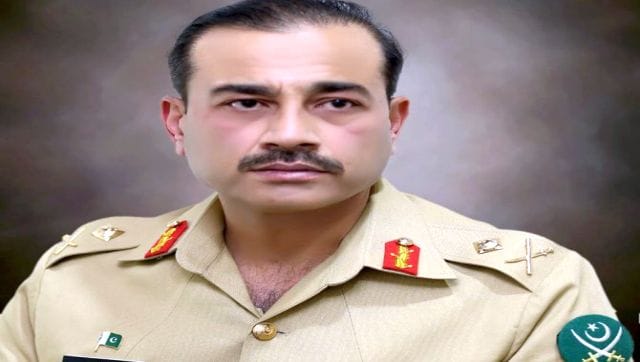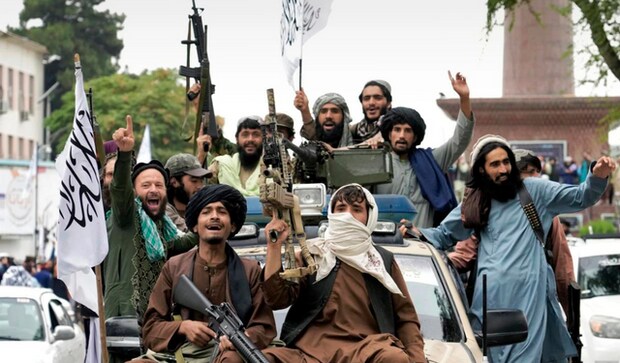Gen Asim Munir unlikely to be busy on India front for now as Imran Khan, hostile Durand Line pose new challenges
A deteriorating economic situation may also compel restraint on the part of Pakistan Army but India needs to keep a close watch as a new leadership takes charge of the army apparatus in Pakistan

General Asim Munir . Image courtesy ISPR
设置几个月的争议在休息,Lt Gen Syed Asim Munir Shah was appointed Army Chief on 24 November, to take over formally from the retiring incumbent, Gen Qamar Javed Bajwa, on 29 November. The apprehension that President Arif Alvi would not accept or delay his assent did not come true, although he went through the motions of flying down to Lahore to meet former prime minister Imran Khan. He returned the same evening to sign his assent, indicating perhaps an intention of the Pakistan Tehrik-e-Insaf (PTI) leadership not to seek confrontation with the new army leadership. The technical glitch of Lt Gen Asim Munir’s retirement date in his current rank, slated for 27 November, two days before Bajwa’s retirement, was overcome by passing a resolution under rules of business of the Army Act, 1952 in a Cabinet meeting earlier in the day.
Asim姆尼尔将巴基斯坦15陆军参谋长(没有t counting the two British officers- Messervy and Gracey, who helmed it between 1947-51). He belongs to the illustrious Frontier Force Regiment (FFR), otherwise known as the Piffers regiment, set up by the British as the third oldest infantry unit in Pakistan in 1843. He would be the fourth Chief from the Piffers, three others being Generals Musa (1958-66), Abdul Waheed Kakar (1993-96) and Raheel Sharif (2013-2016). He would be the eighth Punjabi Army Chief after Zia, Tikka Khan, Asif Nawaz, Karamat, Kayani, Raheel Sharif and Bajwa. Three Pashtuns (Ayub, Gul Hassan and Abdul Waheed Kakar), one Hazara (Musa), one Qizilbash (Yahya) and two Mohajirs (Aslam Beg and Musharraf) also became army chief in Pakistan.
Along with the army chief’s appointment, Pakistan’s other four-star General’s slot – the Chairman, Joint Chiefs of Staff Committee (CJCSC) was also filled up by Lt Gen Sahir Shamshad Mirza, Sindh Regiment, erstwhile X Corps Commander, Rawalpindi. The present incumbent as CJCSC, Mohd Nadeem Raza retired on 27 November.
Asim Munir hails from a modest middle-class family in Dheri-Hassanbad, near Rawalpindi. His parents migrated from Jalandhar, east Punjab. He started his education in a madrassa. He joined the army after passing out with the sword of honour (first position) from the 17th course of the Officers Training School (OTS), Mangla (a feeder stream for recruitment alongside the Pakistan Military Academy long courses at Kakul) in 1986. He is the first Army General who is a ‘Hafiz e Quran’, qualifying in a religion-based course which he completed from a seminary in Rawalpindi, while in service as a Colonel. He is reputed to have the ability to recite from the Quran forthwith.
Asim Munir served in a Pakistani troops contingent deployed in Saudi Arabia and as Chief Instructor in the Command and Staff College, Quetta (CSC) earlier. He was well liked by Gen Bajwa. He held crucial assignments, heading a brigade in the turbulent Khyber Pakhtunkhwa (KP) province and as the Commander, Force Command Northern Areas (FCNA), when Bajwa was Corps Commander, Rawalpindi. He was then was brought in as DG Military Intelligence (DGMI) in 2017. He was promoted as DG, Inter Services Intelligence (ISI) in October, 2018 but joined a little late as Lieutenant General in November, 2018. This was a rather lucky quirk of fate which left him as the senior most among three star Generals when the COAS selection sweepstakes came up.
However, Asim was transferred out from ISI in a cloud after just eight months apparently when he apprised Imran Khan, the prime minister then, of alleged financial misdemeanors of certain associates close to the First Lady, Bushra Sheikh @ `Pinky Pir’, in Punjab. Imran took umbrage and asked Gen Bajwa to shift him out from ISI. Asim was posted to the XXX Corps, Gujranwala in June, 2019. After a two year stint there, he was serving in General Headquarters from October, 2021 as Quartermaster General (QMG) till his elevation as army chief.
When consulted in London by Shehbaz Sharif recently, former PM Nawaz Sharif possibly took on board Munir’s latent angst against Imran Khan and opted for the seniority yardstick, chastened perhaps, by the memory of his own unfortunate consequences in not observing seniority while choosing Army Chiefs in the past.
Former prime minister Imran Khan had focused on making the selection of the new army chief controversial during his entire agitational program during the last six-seven months. He seems to have failed to extract mileage from perceptions of division within the army. After the abortive attempt on his life during his ‘Long March’, in Wazirabad on 3 November, Imran Khan had been trying to take stock of what political options he now has before him. He declared he is moving on from allegations of a sinister foreign conspiracy behind his ouster. Effecting another `U turn’, Imran declared he would accept any decision the government makes on the army chief’s appointment. The demonstration in Rawalpindi on 26 November failed to attract very large crowds. He did not proceed to Islamabad. Instead, he announced a plan to dissolve the Punjab and KP provincial assemblies shortly.
During the build up to the army chief’s appointment, dissensions within the army simmered and reports surfaced of support for Imran Khan among families of army officers. There was a huge traffic of trollers in social media disparaging Bajwa and his team of loyal Generals. Gen Bajwa stopped the pensions of some retired Army officers for voicing dissent. A section of retired Lieutenant Generals known to have sympathy for Imran Khan, such as Asif Yasin, Tariq Khan and Naeem Khan Lodhi, opposed the Establishment position on Asim Munir’s date of retirement from service, holding it valid only till 27 November, deeming him ineligible for selection as army chief.
Gen Bajwa himself became quite controversial during his extended tenure, forcing him to admit in a farewell speech at a martyrs’ ceremony on 23 November of a `catharsis’ confronting the army, `mistakes by all’ in the past, and a decision to stay neutral in domestic politics in the future. The leak of income tax returns of his family members emerging on journalist Ahmed Noorani’s website, `Fact focus’, showed huge accretion in financial assets. This did not help his image.
Asim Munir has had the reputation of being a tough officer and a stickler for rules in his earlier assignments. This could presage a phase of morale cleansing and anti- corruption crusades within the Army, though the outgoing Chief may not be harassed beyond a point.
Soon after the decision to appoint Asim Munir Army Chief became public, reports surfaced about two senior Lieutenant Generals, Azhar Abbas and Faiz Hameed, both from the 75 th Pakistan Military Academy, Kakul Long Course, seeking voluntary retirement. The controversial Faiz Hameed’s option to retire has reportedly been promptly accepted.
As Gen Asim Munir gradually puts his own team of officers in place, his priority must clearly lie in ending dissensions within the army, at middle and senior levels. He must show objectivity and lend a healing touch. Three appointments of Lieutenant Generals, to fill up vacant slots, have come to notice after the new army chief’s appointment. Lt Gen Nauman Zakariya, Armoured Corps, goes as X Corps Commander, Rawalpindi. Lt Gen Ahsan Gulrez, Frontier Force Regiment becomes Director General, Joint Staff at Joint Staff Headquarters, Chaklala and Lt Gen Shahid Imtiaz, AK Regiment, becomes the new Quartermaster General. If Azhar Abbas is allowed to retire, who Munir now appoints as Chief of General Staff (CGS) would be of great interest to military analysts.
Asim姆尼尔无法漠视高级ar的焦虑my officers against Imran. How he deals with the populist support behind the latter will be interesting to watch. While he may feel naturally obliged at the manner in which the Pakistan Democratic Movement (PDM) government bent backwards to smoothen ruffles about his retiring date, he may need to distance himself from any personally driven persecution of Imran Khan, though the legal noose against the latter in the Toshakhana and foreign funding cases may well tighten.
On the external front, the difficult situation prevailing in Afghanistan after the Taliban take-over will be a concern. Far from being deferential to their past handlers in the Pakistan Army, the Taliban have been resilient, even defiant while dealing with persisting border infringements across the Durand Line and refusing to handover Tehrik-e-Taliban (TTP) militants on Pakistan’s wanted lists. The TTP have now openly suspended their fragile ceasefire. Attacks on Pakistani security forces in Swat and other areas of KP and Balochistan have increased. These would have to be dealt with an iron hand.
In course of his military service, Asim Munir may not have had too much exposure to his counterparts in the United States. Whether this inhibits his ability to carry forward Gen Bajwa’s recent cozying up to the Americans remains to be seen, as also his dealings with the Chinese, particularly to allay the latter’s apprehensions on the China Pakistan Economic Corridor (CPEC)‘s languishing projects.
The fact of Asim Munir’s being a ‘Hafiz e Quran’ and the circumstance of his heading the ISI in February, 2019 when the Pulwama attack occurred in Jammu and Kashmir has led some scaremongers in India to assume Munir may well be a hardline Islamic fundamentalist, which cannot augur well for India. Hard line he may well be, as any General trained in old school Pakistan Army mind sets would be but it may not necessarily follow that he is a supporter of radical Islamic views. Though Asim Munir will have a formidable set of challenges on his plate to tackle and India policy may perforce take a back seat, any immediate escalation of hostility or disruption of the ceasefire status quo on the Line of Control seems unlikely.
Pakistan’s difficult economic situation may also compel restraint. However, India cannot afford to be complacent and must continue to closely observe the settling down process of the new army chief in Pakistan.
The writer is a former special secretary, Cabinet Secretariat. Views expressed are personal.
Read all theLatest News,Trending News,Cricket News,Bollywood News,
India NewsandEntertainment Newshere. Follow us onFacebook,TwitterandInstagram.
also read

Pakistan: Election Commission issues arrest warrants for Imran Khan, his aides in contempt case
The case is based on statements issued by top Pakistan Tehreek-e-Insaf leaders against the Election Commission of Pakistan and Chief Election Commissioner Sikander Sultan Raja

Pakistan’s Taliban challenge: With over 100 attacks in two months, Islamabad faces grim security situation
A year and a half after the Taliban captured Kabul the euphoria has vanished, the mood is grim and Pakistan’s policy is in tatters

WATCH: Taliban mocks Pakistan Army with video of TTP snipers targeting soldiers with US weapons
The video shows TTP snipers attacking soldiers from the Pakistan Army and the country's various paramilitary forces at various locations across the Khyber Pakhtunkhwa and Balochistan provinces of Pakistan
